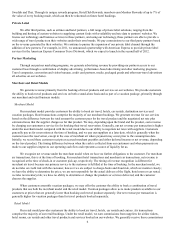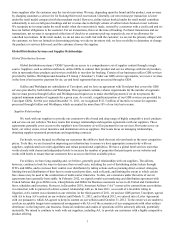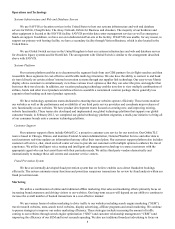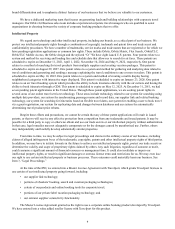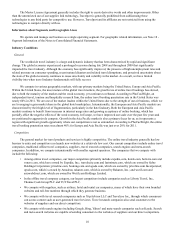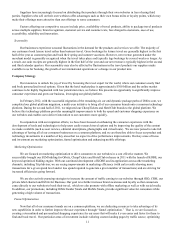Orbitz 2011 Annual Report Download - page 16
Download and view the complete annual report
Please find page 16 of the 2011 Orbitz annual report below. You can navigate through the pages in the report by either clicking on the pages listed below, or by using the keyword search tool below to find specific information within the annual report.16
be materially and adversely affected.
Furthermore, our GDS service agreement with Travelport permits us to pursue direct connect relationships with new or
existing suppliers during the term of the agreement, which expires on December 31, 2014, if the Travelport GDSs do not have
material content or if there is a material economic difference between the cost of obtaining supplier content from the Travelport
GDSs relative to a direct connect relationship. If we pursue a direct connect relationship and Travelport disputes our ability to
do so under our GDS service agreement, we may become involved in a potentially costly and uncertain litigation dispute with
Travelport. These contractual obligations may reduce our flexibility to implement changes to our business in response to
changing economic conditions, industry trends, or technological developments. As a result, the limitations imposed by the GDS
service agreement could place us at a competitive disadvantage and negatively impact our business and results of operations,
particularly in the current economic environment where our suppliers are under increased pressure to reduce their overall
distribution costs.
We rely on Travelport to issue letters of credit on our behalf under its credit facility.
As of December 31, 2011, there were $74.2 million of outstanding letters of credit issued by Travelport on our behalf.
Under the Separation Agreement, as amended, (“the Separation Agreement”), Travelport has agreed to issue U.S. dollar
denominated letters of credit on our behalf in an aggregate amount not to exceed $75.0 million so long as Travelport and its
affiliates (as defined therein) own at least 50% of our voting stock. If we do not have a separate letter of credit facility in place
in the event Travelport is no longer obligated or is unable to issue letters of credit on our behalf, or if we exceed the
$75.0 million limitation, or if we require letters of credit denominated in foreign currencies, we would be required to issue
letters of credit under our revolving credit facility or to establish cash reserves, which could significantly reduce our liquidity
and cash available to grow our business. As of December 31, 2011, we had the equivalent of $10.8 million of outstanding
letters of credit issued under our revolving credit facility, the majority of which were denominated in Pounds sterling.
We have granted Travelport perpetual licenses to use certain of our intellectual property, which could facilitate Travelport's
ability to compete with us.
We are party to a Master License Agreement with Travelport that governs each of our and Travelport's rights to use
certain of the other's intellectual property. The Master License Agreement permits Travelport and its affiliates to use and, in
some cases, to sublicense to third parties certain of our intellectual property, including:
• our supplier link technology;
• portions of ebookers' booking, search and vacation package technologies;
• certain of our products and online booking tools for corporate travel;
• portions of our private label vacation package technology; and
• our extranet supplier connectivity functionality.
Travelport and its affiliates may use these technologies as part of, or in support of, their own products or services,
including in some cases to directly compete with us.
The Master License Agreement permits Travelport to sublicense our intellectual property (other than our supplier link
technology) to a party that is not an affiliate of Travelport, except that Travelport may not sublicense our intellectual property to
a third party for a use that competes with our business, unless Travelport incorporates or uses our intellectual property with
Travelport products or services to enhance or improve Travelport products or services (other than to provide our intellectual
property to third parties on a stand-alone basis). Travelport and its affiliates are permitted to use our intellectual property to
provide their own products and services to third parties that compete with us. With respect to our supplier link technology,
Travelport has an unrestricted license. These Travelport rights could facilitate Travelport's, its affiliates' and third parties' ability
to compete with us, which could have a material adverse effect on our business, financial condition and results of operations.
We depend on our supplier and partner relationships and adverse changes in these relationships or our inability to enter
into new relationships could negatively affect our access to travel offerings and reduce our revenue.
We rely significantly on our relationships with hotels, airlines and other suppliers and travel partners. Adverse changes in
any of these relationships, or the inability to enter into new relationships, could negatively impact the availability and
competitiveness of travel products offered on our websites. Our arrangements with suppliers and other travel partners may not
remain in effect on current or similar terms, and the net impact of future pricing or revenue sharing options may adversely


